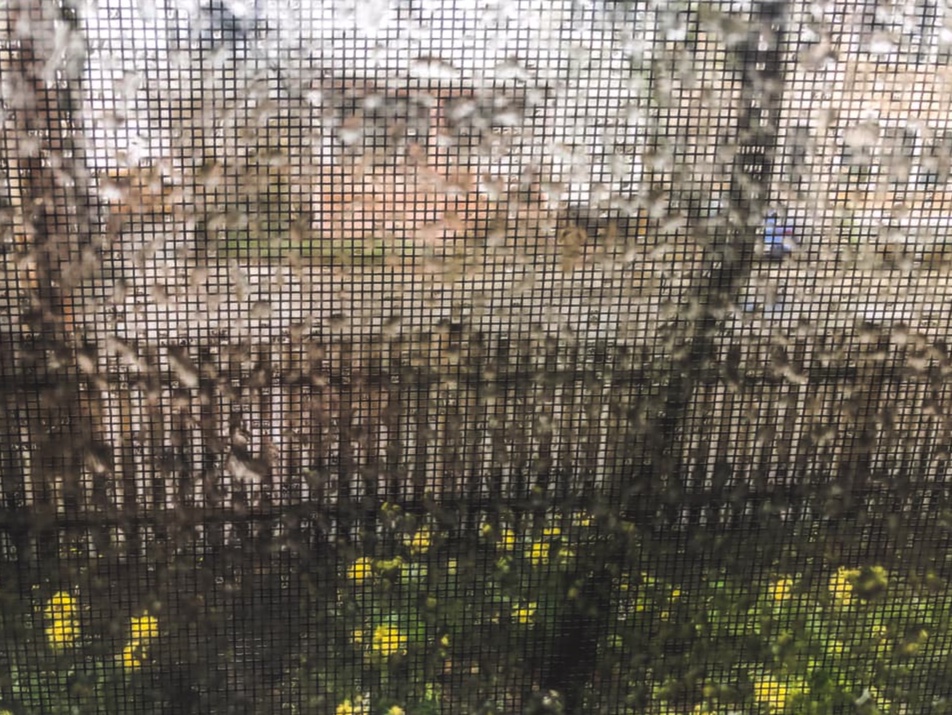
A rainy day in the face of humanity and COVID-19, Cambridge, MA – photopictorialist study by Linda Morgenstern. (c) L Morgenstern 2020
Today as a special treat, and to help us through these terrible times. I am reposting a photograph and essay by a dear friend documentary film maker, artist, and writer, Linda Morgenstern.
Mask Fail 3.
Daily dog walk.
Today is rainy and cold.
Neither Bella nor I want to be out for long.
We have finished our loop and are headed back.
A young couple is walking toward us.
Sister and brother…husband and wife?
It is impossible to know from a half a block away.
What is unmistakable is that the woman is crying.
Hard.
The man is holding her to keep her upright. Her body is buckling from the force of her sobbing. He pulls her toward his chest.
I cut cross the street and her face follows the sound of my footsteps. I am standing directly across them on the opposite sidewalk.
She can not catch her breath and I see her mask has been pulled down around her neck.
I can not look away from her sorrow and the shock in her eyes.
Some instinct pulls my own mask off so I can meet her with my exposed face.
My hand rises up to my chest in the place I think holds my heart. I feel my eyes close and I bow to her.
The sacred in me.
The sacred in you.
The scared in all of us now.
I have been thinking about what it means to take off a mask.
Literally and figuratively.
And how backwards everything is.
We protect each other from ourselves by wearing masks.
We are no longer visible to each other behind our masks and our doors.
But behind our individual shields, our masks are being stripped away.
A friend who lives in New York City tells me, by Messenger, he saw a man dying from his window as EMT’s were unable to resuscitate his neighbor. It was, he said, horrible.
I remember when I moved to NYC in 1980. I was twenty and stunned by the casualness of New Yorkers stepping over the bodies of men and women sprawled on the sidewalks and in the doorways. Addicts, alcoholics, the floridly psychotic, and people who ended up on the street because circumstances had moved beyond their control and nothing and no one was there to catch them.
It took less than a month for me, walking from midtown to my apartment downtown in the East Village, before I no longer stopped and asked if I could help. I had become a New Yorker with a brisk walk, avoiding bodies without missing a step.
Today I feel spring almost turn back into winter as evening approaches. New England is like that in its threat, in any month through the end of April, the inhospitable cold might reappear.
I walk the last few blocks home with a dog in one hand and a mask in the other. A sense of reverence from the love in the broken heart I just witnessed.
And I wonder, how common will it become to see the wracked sobs of strangers? How often will we see death out the window?
Will we fundamentally change, as a culture, when we know with full awareness that the last goodbye might already have been said? What will it feel like when the spectacle of private grief becomes a routine encounter?
Will we remember our shared humanity?
Will we recognize our interdependence?
Or will suffering and scarcity push us to ever greater divide?
Is it possible this is the moment when we find our collective heart and our political will?
For those communities tumbling into the deepest chasm, the answer is urgent.
In the quiet of the city I live in, I am increasingly aware of the birds singing. Have they ever been so loud or so beautiful as they are today?
Bird songs and sirens.
It has already become a familiar refrain.
Bird songs and sirens.
I take a last gulp of the rainy air with the words of my mother in my ears, “Wear a scarf. You could catch a death of a cold.”
How foolish to think this suffering of our making would not come to our own door.
(c) L. Morgenstern 2020
